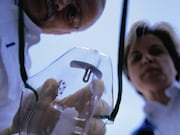ODS is not associated with increased risk for adverse events among carefully selected patients
FRIDAY, April 12, 2019 (HealthDay News) — For carefully selected pediatric patients, operator-directed sedation (ODS) for congenital cardiac catheterization procedures is not associated with an increased risk for adverse events and may reduce case time and charges, according to a study published online April 10 in JACC: Cardiovascular Interventions.
Michael L. O’Byrne, M.D., from The Children’s Hospital of Philadelphia, and colleagues conducted a single-center retrospective cohort study to compare the relative safety, cost, and times of catheterization procedures performed with ODS versus general anesthesia (GA) from a cardiac anesthesiologist. Propensity score-adjusted models were used to compare the risk for adverse events.
The researchers reviewed 4,424 procedures in 2,547 patients during the study period. Twenty-seven percent of cases were performed with ODS: 70 percent were diagnostic procedures; 17 percent involved device closure of patent ductus arteriosus; 5 percent were balloon pulmonary valvuloplasty; and 3 percent were pulmonary artery angioplasty. In adjusted models, the risk for adverse events was significantly lower for ODS versus GA cases (odds ratio, 0.66). Significantly shorter total room and case time were also observed with ODS. Compared with GA cases, ODS cases had significantly lower professional and hospital charges (charge ratios, 0.88 and 0.84, respectively).
“We propose that careful review of patient history can better identify patients in whom ODS is safe and effective and that its application can reduce resource utilization, specifically case times and costs,” the authors write.
Copyright © 2019 HealthDay. All rights reserved.








